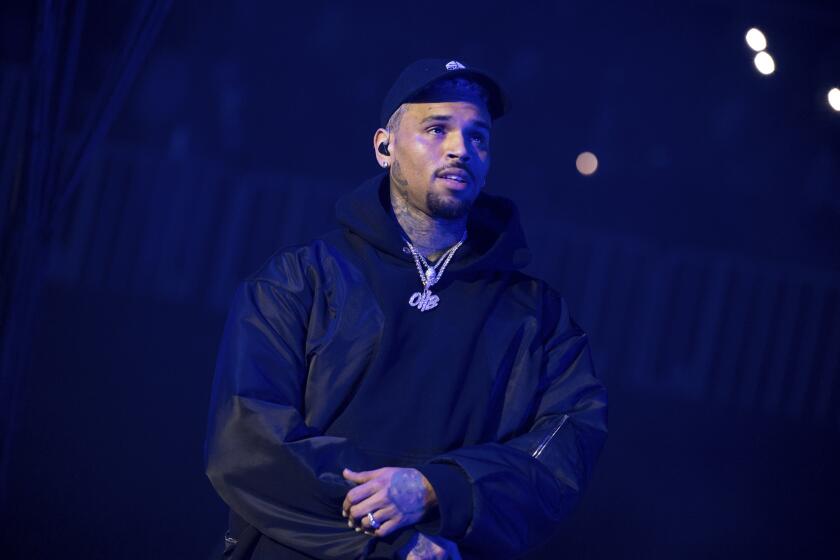Los Lobos’ Universal Note
- Share via
In some ways, Los Lobos never change.
They have always been performers of few words, rock stars without special effects or mannerisms or choreography. No big fanfare greets the greatest Chicano band of all time. They casually walk out on stage, as they did Friday at the House of Blues in West Hollywood and as they have for almost 30 years, pick up their instruments and simply start to play.
Mostly, they just stand there. They don’t prance or jump around or even grimace during searing guitar solos that might tempt lesser rockers into attention-grabbing antics.
Los Lobos lie back and let their music do the talking. It’s the fans who get excited. The crowd’s bicultural cheers--from yahoo to ajua!--signaled the band’s broad appeal. Admirers came in all colors, ages and styles. They were foreign-born and native-born, Westside and Eastside, Hollywood hip and San Fernando Valley blue-collar.
Once, this may have been just another band from East L.A., to borrow the title of their 1978 debut album of Mexican folk music. Today, Los Lobos are a band for Los Angeles at large--grounded in one heritage while embracing others, respecting the past while always looking forward.
But it’s not the band that changed. The city did. UCLA student Ian Brown, 22, was still a child when Los Lobos was picked band of the year in Rolling Stone critics’ poll of 1985, the year of their highly acclaimed album, “How Will the Wolf Survive?” Brown recalls listening to that groundbreaking work while riding with his parents in the family car. Now, the English major and aspiring musician admires the seamless “convergence of influences” in Los Lobos’ eclectic sound.
“This is the only band that can do it in a way that meshes so well together,” Brown said while waiting for the show to start. “I think they’re brilliant.”
Friday’s masterful two-hour set--a down-home jambalaya of rock and rancheras, country and cumbias, blues and boleros--featured several selections from the band’s new album, “Good Morning Aztlan.”
Fans swayed and danced, or just smiled at one another to acknowledge a grooving bass riff by Conrad Lozano or the cumulative sonic thrill of three front-line guitars wielded by David Hidalgo, Cesar Rosas and Louie Perez.
The four former Garfield High School buddies formed the band in 1973. Steve Berlin, on keyboards, sax and flute, joined 10 years later. (The recent addition of two honorary Lobos, percussionists Cougar Estrada and Victor Bisetti, add punch to the live sound.)
Los Lobos emerged in the angry days of the Chicano Movement, two years after a violent antiwar riot engulfed their East L.A. community in 1971. Perez recalls the pressure they felt from the radicals of the day, cultural separatists promoting a self-governing nation under the concept of Aztlan, the mythical homeland of the Aztecs.
“I thought that was ridiculous,” says Perez, who sat with Hidalgo and Berlin for a brief interview Thursday before a record release concert at Club Fais Do Do. “They wanted us to be political, and we just wanted to play music.”
Ironically, the band now waves the Aztlan flag in the title of their new song, which deftly sketches scenes from daily life in the barrio. But the evocative images, they argue, are calculated to hit a universal chord of family, neighborhood and community.
“We’re taking it [Aztlan] back to the more pure definition: You can go home again,” Perez explains.
To some kids in East L.A., Los Lobos were as big as the Beatles. It seemed only a matter of time for other Chicano bands to follow their footsteps from the barrio to the big time. “We really thought that was going to happen,” Perez says. “We thought we were opening the doors, but nobody came through.”
Today, there’s renewed hope with a new generation of promising bands, such as Quetzal, which opened at the House of Blues. At the show’s finale, Los Lobos were joined on stage by three members of a local punk-rock band, Los Villains. This wasn’t simple promotion; it was a little nepotism. The young musicians happen to be the Lobos’ offspring, sons of Hidalgo and Perez.
“You gotta back up the kids,” says Hidalgo, who puts a Los Villains sticker on his accordion.
“That’s the extent of his retirement plan,” Berlin jokes. “They’re his 401(k).”
“That’s my future,” agrees Hidalgo, but he wasn’t laughing.
Commercially, Los Lobos have struggled. The band has always been hard to categorize for radio formats. Too Latin for Anglos and too Anglo for Latinos, as their manager puts it. They had their biggest hit with “La Bamba,” the 1987 soundtrack of the film about ‘50s rock star Ritchie Valens, which yielded a No. 1 single. But even that multi-platinum success didn’t boost sales of other albums, notes Berlin.
Creatively, it didn’t dazzle or derail them either. “It actually forced us to stick to our guns,” Hidalgo says. “It was fun, but we knew it was temporary. We didn’t own it.”
The following year, the band came back with a collection of traditional Mexican songs titled “La Pistola Y El Corazon” (The Pistol and the Heart).They still remember it fondly as one of their favorite projects, a joy to make.
“And it does what we started out to do--share our culture with a larger audience,” Hidalgo says.
Los Lobos seem happy to be on the road again. They cruised around town last week in a big, lumbering RV, making stops for almost nightly performances, including an in-store one at Amoeba Music in Hollywood and a short set for “LATV Live,” a local Latin music show on cable station KJLH.
“If it all ended tomorrow,” muses Perez, “I think we’d be really proud of what we’ve accomplished.”
More to Read
The biggest entertainment stories
Get our big stories about Hollywood, film, television, music, arts, culture and more right in your inbox as soon as they publish.
You may occasionally receive promotional content from the Los Angeles Times.










